The Principles of CST Assignment PDF
VerifiedAdded on 2021/06/17
|6
|1422
|81
AI Summary
Contribute Materials
Your contribution can guide someone’s learning journey. Share your
documents today.
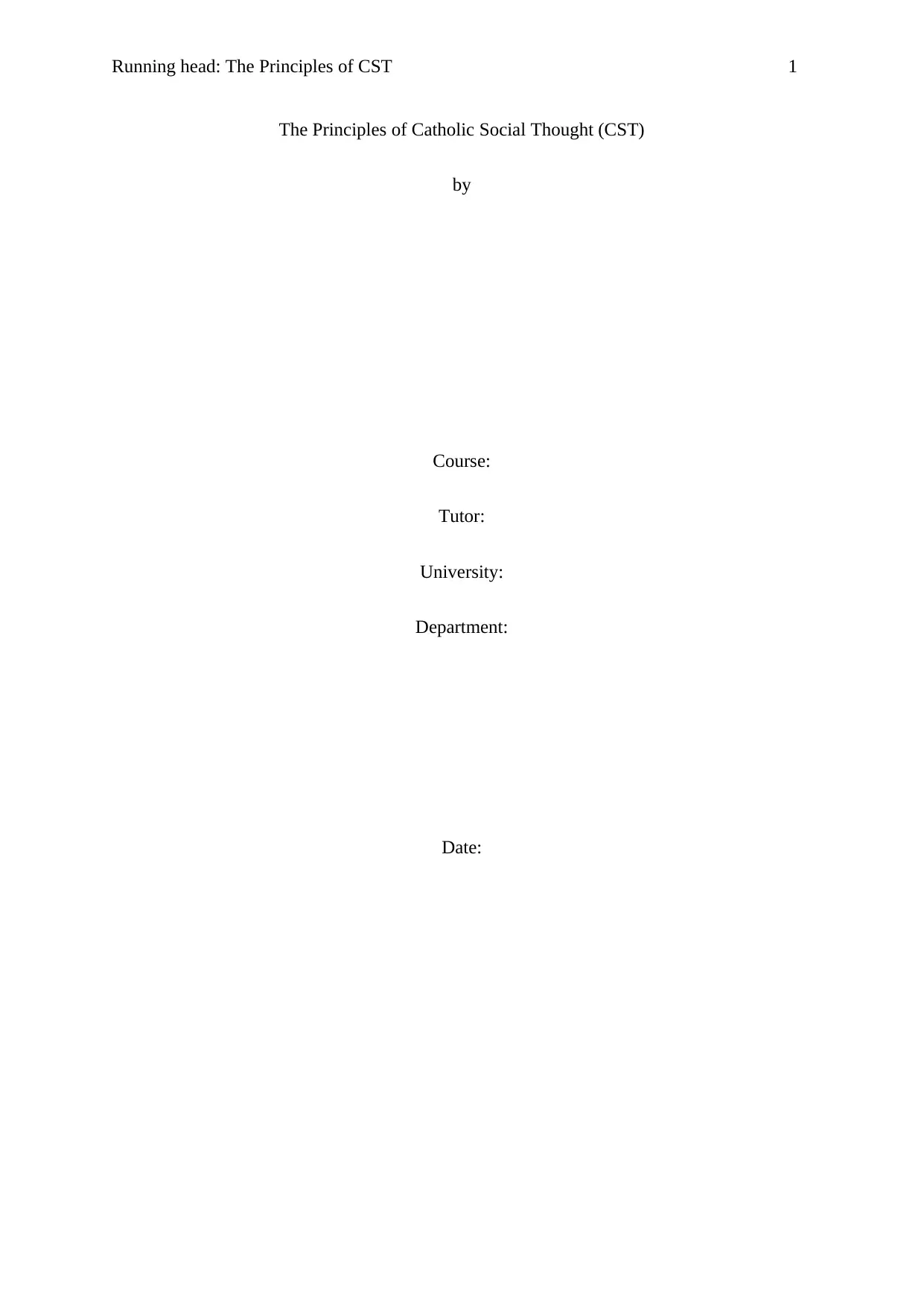
Running head: The Principles of CST 1
The Principles of Catholic Social Thought (CST)
by
Course:
Tutor:
University:
Department:
Date:
The Principles of Catholic Social Thought (CST)
by
Course:
Tutor:
University:
Department:
Date:
Secure Best Marks with AI Grader
Need help grading? Try our AI Grader for instant feedback on your assignments.
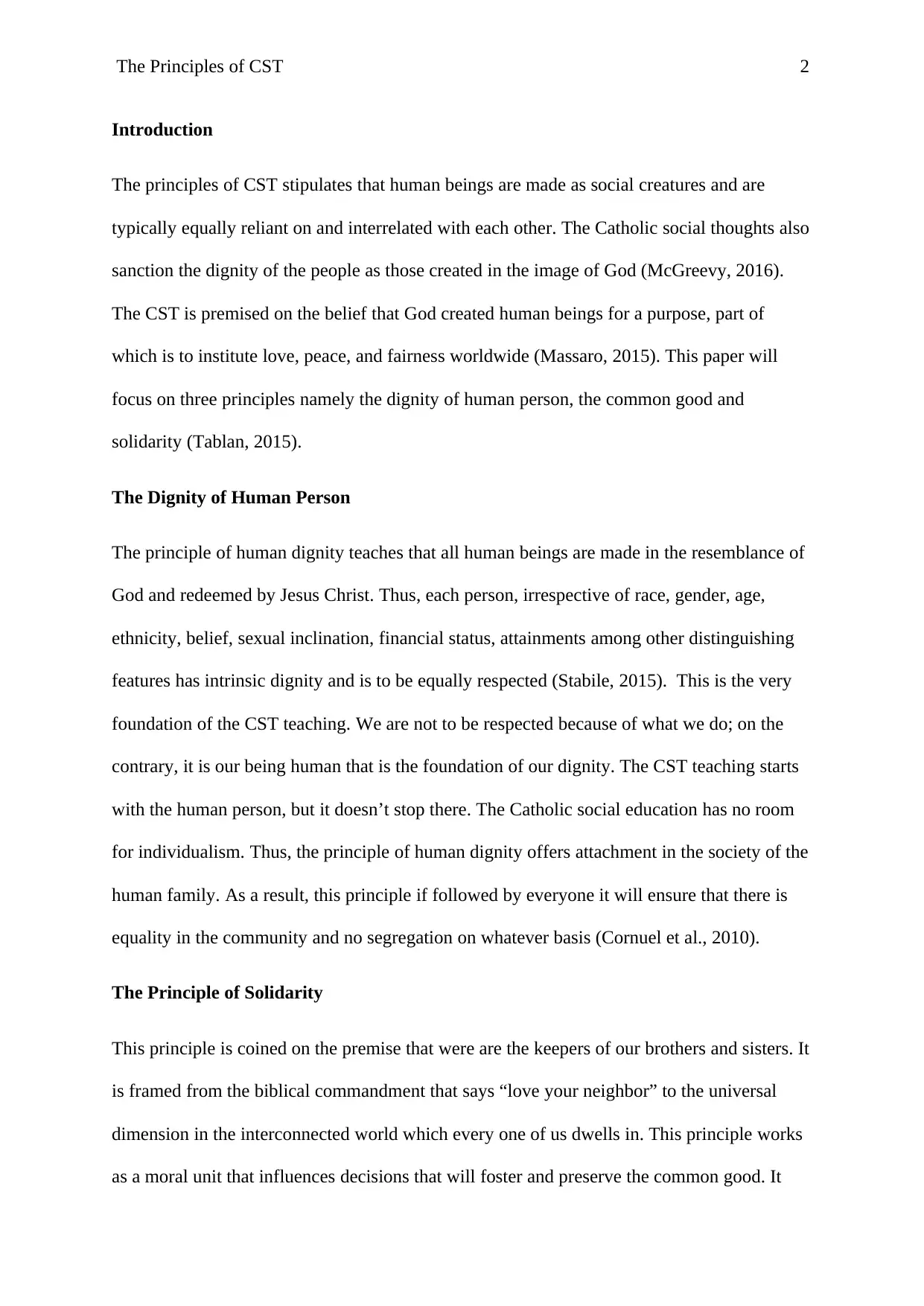
The Principles of CST 2
Introduction
The principles of CST stipulates that human beings are made as social creatures and are
typically equally reliant on and interrelated with each other. The Catholic social thoughts also
sanction the dignity of the people as those created in the image of God (McGreevy, 2016).
The CST is premised on the belief that God created human beings for a purpose, part of
which is to institute love, peace, and fairness worldwide (Massaro, 2015). This paper will
focus on three principles namely the dignity of human person, the common good and
solidarity (Tablan, 2015).
The Dignity of Human Person
The principle of human dignity teaches that all human beings are made in the resemblance of
God and redeemed by Jesus Christ. Thus, each person, irrespective of race, gender, age,
ethnicity, belief, sexual inclination, financial status, attainments among other distinguishing
features has intrinsic dignity and is to be equally respected (Stabile, 2015). This is the very
foundation of the CST teaching. We are not to be respected because of what we do; on the
contrary, it is our being human that is the foundation of our dignity. The CST teaching starts
with the human person, but it doesn’t stop there. The Catholic social education has no room
for individualism. Thus, the principle of human dignity offers attachment in the society of the
human family. As a result, this principle if followed by everyone it will ensure that there is
equality in the community and no segregation on whatever basis (Cornuel et al., 2010).
The Principle of Solidarity
This principle is coined on the premise that were are the keepers of our brothers and sisters. It
is framed from the biblical commandment that says “love your neighbor” to the universal
dimension in the interconnected world which every one of us dwells in. This principle works
as a moral unit that influences decisions that will foster and preserve the common good. It
Introduction
The principles of CST stipulates that human beings are made as social creatures and are
typically equally reliant on and interrelated with each other. The Catholic social thoughts also
sanction the dignity of the people as those created in the image of God (McGreevy, 2016).
The CST is premised on the belief that God created human beings for a purpose, part of
which is to institute love, peace, and fairness worldwide (Massaro, 2015). This paper will
focus on three principles namely the dignity of human person, the common good and
solidarity (Tablan, 2015).
The Dignity of Human Person
The principle of human dignity teaches that all human beings are made in the resemblance of
God and redeemed by Jesus Christ. Thus, each person, irrespective of race, gender, age,
ethnicity, belief, sexual inclination, financial status, attainments among other distinguishing
features has intrinsic dignity and is to be equally respected (Stabile, 2015). This is the very
foundation of the CST teaching. We are not to be respected because of what we do; on the
contrary, it is our being human that is the foundation of our dignity. The CST teaching starts
with the human person, but it doesn’t stop there. The Catholic social education has no room
for individualism. Thus, the principle of human dignity offers attachment in the society of the
human family. As a result, this principle if followed by everyone it will ensure that there is
equality in the community and no segregation on whatever basis (Cornuel et al., 2010).
The Principle of Solidarity
This principle is coined on the premise that were are the keepers of our brothers and sisters. It
is framed from the biblical commandment that says “love your neighbor” to the universal
dimension in the interconnected world which every one of us dwells in. This principle works
as a moral unit that influences decisions that will foster and preserve the common good. It
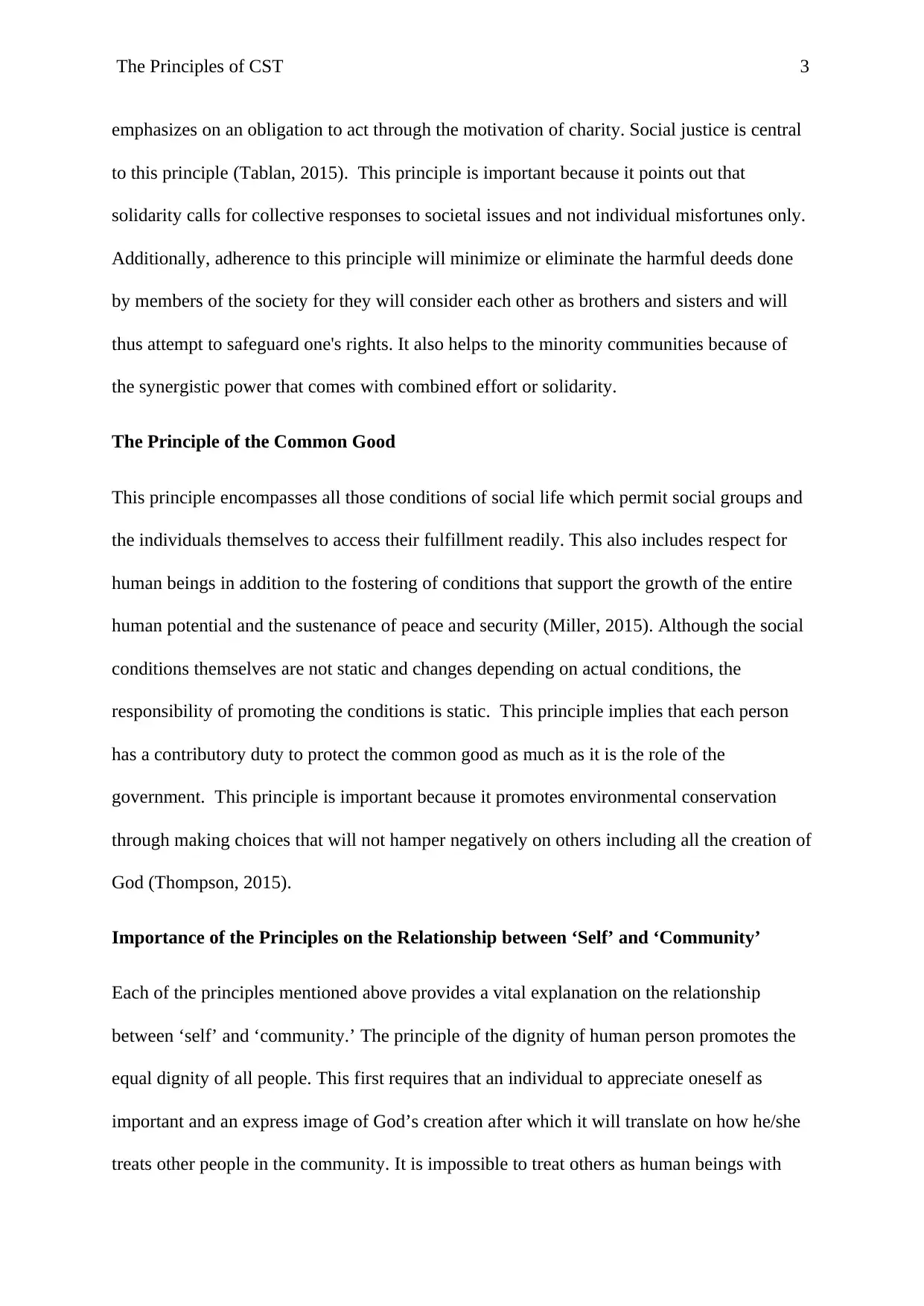
The Principles of CST 3
emphasizes on an obligation to act through the motivation of charity. Social justice is central
to this principle (Tablan, 2015). This principle is important because it points out that
solidarity calls for collective responses to societal issues and not individual misfortunes only.
Additionally, adherence to this principle will minimize or eliminate the harmful deeds done
by members of the society for they will consider each other as brothers and sisters and will
thus attempt to safeguard one's rights. It also helps to the minority communities because of
the synergistic power that comes with combined effort or solidarity.
The Principle of the Common Good
This principle encompasses all those conditions of social life which permit social groups and
the individuals themselves to access their fulfillment readily. This also includes respect for
human beings in addition to the fostering of conditions that support the growth of the entire
human potential and the sustenance of peace and security (Miller, 2015). Although the social
conditions themselves are not static and changes depending on actual conditions, the
responsibility of promoting the conditions is static. This principle implies that each person
has a contributory duty to protect the common good as much as it is the role of the
government. This principle is important because it promotes environmental conservation
through making choices that will not hamper negatively on others including all the creation of
God (Thompson, 2015).
Importance of the Principles on the Relationship between ‘Self’ and ‘Community’
Each of the principles mentioned above provides a vital explanation on the relationship
between ‘self’ and ‘community.’ The principle of the dignity of human person promotes the
equal dignity of all people. This first requires that an individual to appreciate oneself as
important and an express image of God’s creation after which it will translate on how he/she
treats other people in the community. It is impossible to treat others as human beings with
emphasizes on an obligation to act through the motivation of charity. Social justice is central
to this principle (Tablan, 2015). This principle is important because it points out that
solidarity calls for collective responses to societal issues and not individual misfortunes only.
Additionally, adherence to this principle will minimize or eliminate the harmful deeds done
by members of the society for they will consider each other as brothers and sisters and will
thus attempt to safeguard one's rights. It also helps to the minority communities because of
the synergistic power that comes with combined effort or solidarity.
The Principle of the Common Good
This principle encompasses all those conditions of social life which permit social groups and
the individuals themselves to access their fulfillment readily. This also includes respect for
human beings in addition to the fostering of conditions that support the growth of the entire
human potential and the sustenance of peace and security (Miller, 2015). Although the social
conditions themselves are not static and changes depending on actual conditions, the
responsibility of promoting the conditions is static. This principle implies that each person
has a contributory duty to protect the common good as much as it is the role of the
government. This principle is important because it promotes environmental conservation
through making choices that will not hamper negatively on others including all the creation of
God (Thompson, 2015).
Importance of the Principles on the Relationship between ‘Self’ and ‘Community’
Each of the principles mentioned above provides a vital explanation on the relationship
between ‘self’ and ‘community.’ The principle of the dignity of human person promotes the
equal dignity of all people. This first requires that an individual to appreciate oneself as
important and an express image of God’s creation after which it will translate on how he/she
treats other people in the community. It is impossible to treat others as human beings with
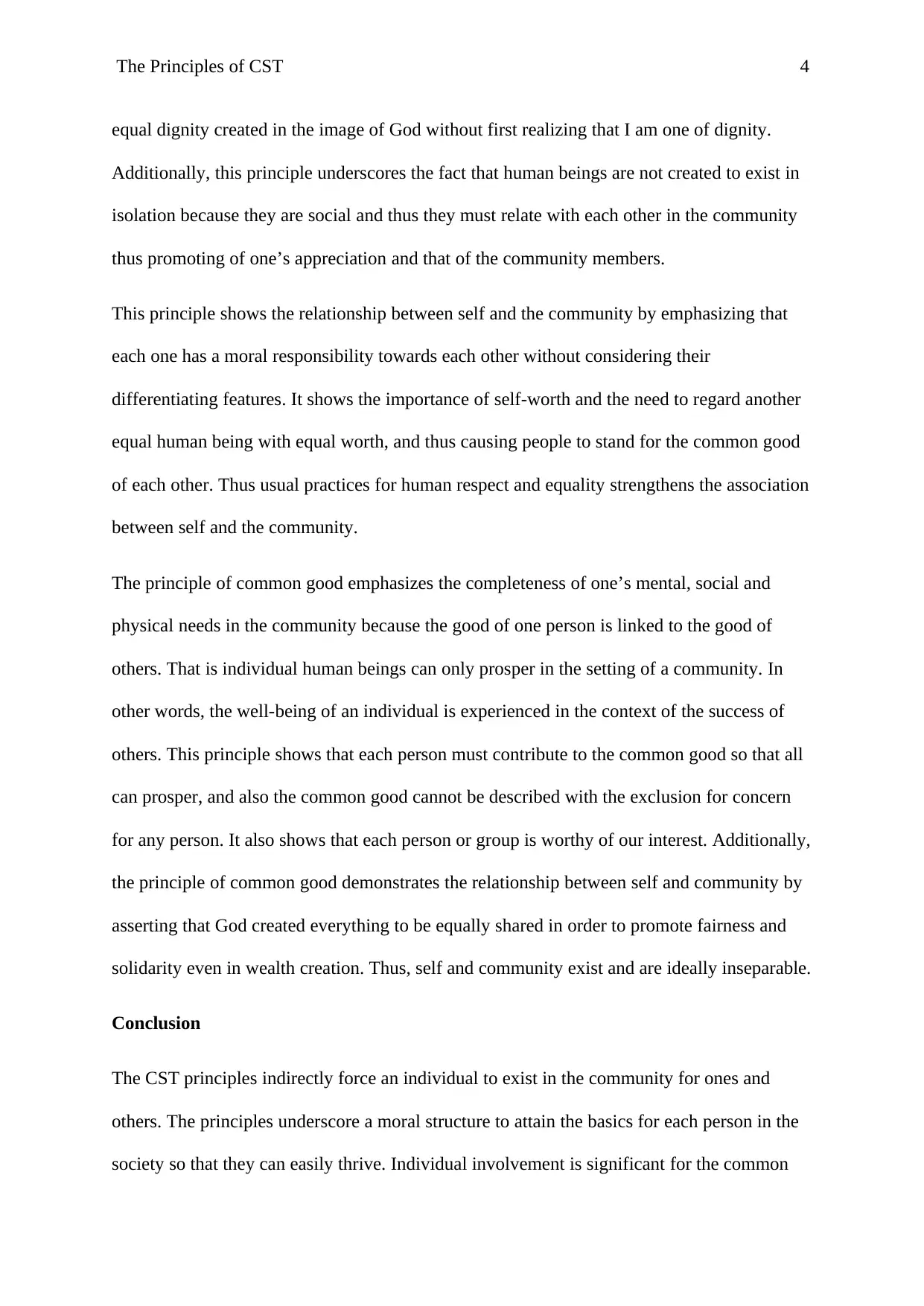
The Principles of CST 4
equal dignity created in the image of God without first realizing that I am one of dignity.
Additionally, this principle underscores the fact that human beings are not created to exist in
isolation because they are social and thus they must relate with each other in the community
thus promoting of one’s appreciation and that of the community members.
This principle shows the relationship between self and the community by emphasizing that
each one has a moral responsibility towards each other without considering their
differentiating features. It shows the importance of self-worth and the need to regard another
equal human being with equal worth, and thus causing people to stand for the common good
of each other. Thus usual practices for human respect and equality strengthens the association
between self and the community.
The principle of common good emphasizes the completeness of one’s mental, social and
physical needs in the community because the good of one person is linked to the good of
others. That is individual human beings can only prosper in the setting of a community. In
other words, the well-being of an individual is experienced in the context of the success of
others. This principle shows that each person must contribute to the common good so that all
can prosper, and also the common good cannot be described with the exclusion for concern
for any person. It also shows that each person or group is worthy of our interest. Additionally,
the principle of common good demonstrates the relationship between self and community by
asserting that God created everything to be equally shared in order to promote fairness and
solidarity even in wealth creation. Thus, self and community exist and are ideally inseparable.
Conclusion
The CST principles indirectly force an individual to exist in the community for ones and
others. The principles underscore a moral structure to attain the basics for each person in the
society so that they can easily thrive. Individual involvement is significant for the common
equal dignity created in the image of God without first realizing that I am one of dignity.
Additionally, this principle underscores the fact that human beings are not created to exist in
isolation because they are social and thus they must relate with each other in the community
thus promoting of one’s appreciation and that of the community members.
This principle shows the relationship between self and the community by emphasizing that
each one has a moral responsibility towards each other without considering their
differentiating features. It shows the importance of self-worth and the need to regard another
equal human being with equal worth, and thus causing people to stand for the common good
of each other. Thus usual practices for human respect and equality strengthens the association
between self and the community.
The principle of common good emphasizes the completeness of one’s mental, social and
physical needs in the community because the good of one person is linked to the good of
others. That is individual human beings can only prosper in the setting of a community. In
other words, the well-being of an individual is experienced in the context of the success of
others. This principle shows that each person must contribute to the common good so that all
can prosper, and also the common good cannot be described with the exclusion for concern
for any person. It also shows that each person or group is worthy of our interest. Additionally,
the principle of common good demonstrates the relationship between self and community by
asserting that God created everything to be equally shared in order to promote fairness and
solidarity even in wealth creation. Thus, self and community exist and are ideally inseparable.
Conclusion
The CST principles indirectly force an individual to exist in the community for ones and
others. The principles underscore a moral structure to attain the basics for each person in the
society so that they can easily thrive. Individual involvement is significant for the common
Secure Best Marks with AI Grader
Need help grading? Try our AI Grader for instant feedback on your assignments.

The Principles of CST 5
conduct and community structure (Finn, 2010). These principles outline the fundamental
requirements for the success of the community with respect to equality and its well-being
including that of the individuals. The establishment of trust, essential and cooperative
community service to human respect and mutual success can only happen where there is a
thorough integration of self into the community. Thus, both self and the community are
lacking without each other.
conduct and community structure (Finn, 2010). These principles outline the fundamental
requirements for the success of the community with respect to equality and its well-being
including that of the individuals. The establishment of trust, essential and cooperative
community service to human respect and mutual success can only happen where there is a
thorough integration of self into the community. Thus, both self and the community are
lacking without each other.
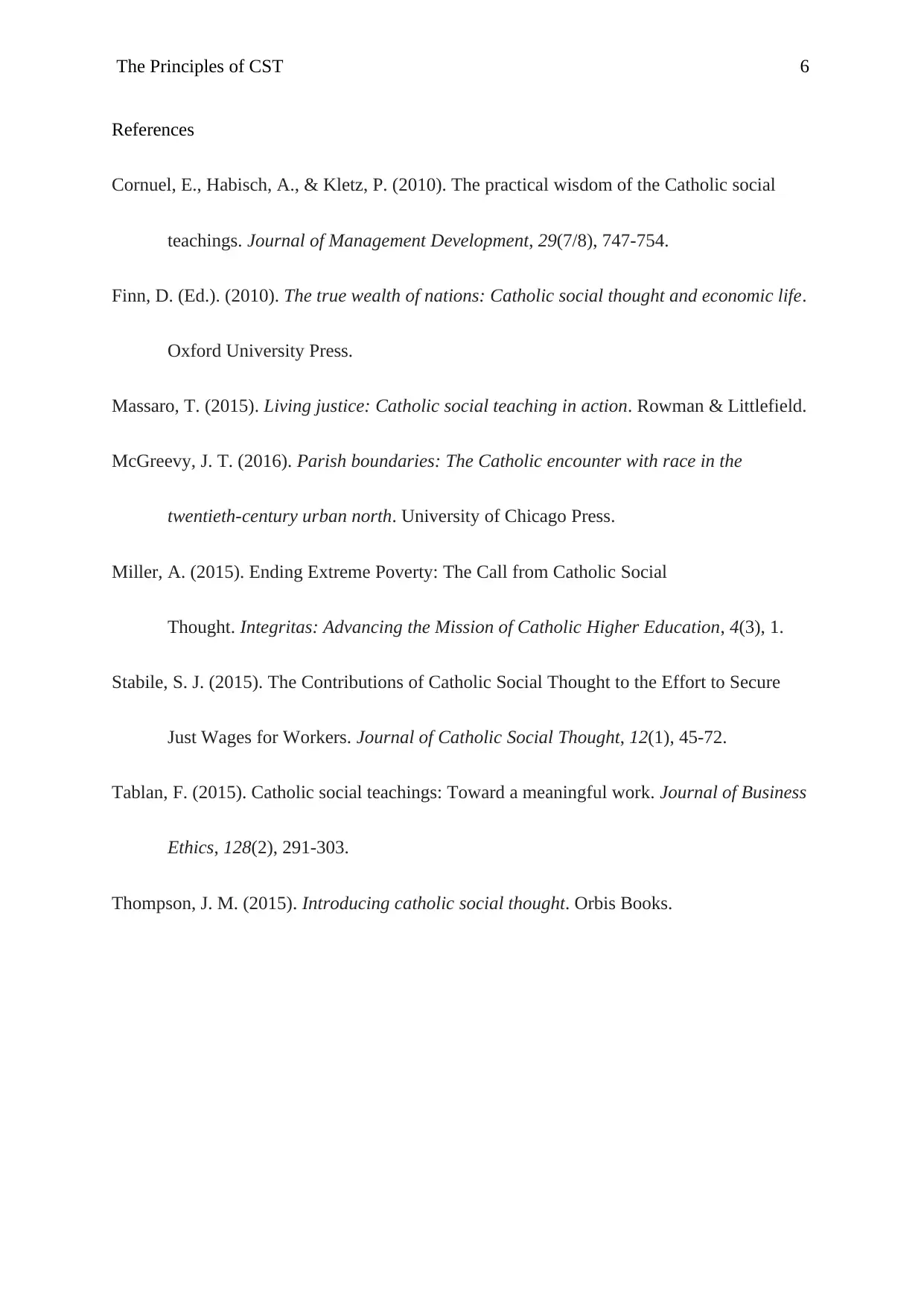
The Principles of CST 6
References
Cornuel, E., Habisch, A., & Kletz, P. (2010). The practical wisdom of the Catholic social
teachings. Journal of Management Development, 29(7/8), 747-754.
Finn, D. (Ed.). (2010). The true wealth of nations: Catholic social thought and economic life.
Oxford University Press.
Massaro, T. (2015). Living justice: Catholic social teaching in action. Rowman & Littlefield.
McGreevy, J. T. (2016). Parish boundaries: The Catholic encounter with race in the
twentieth-century urban north. University of Chicago Press.
Miller, A. (2015). Ending Extreme Poverty: The Call from Catholic Social
Thought. Integritas: Advancing the Mission of Catholic Higher Education, 4(3), 1.
Stabile, S. J. (2015). The Contributions of Catholic Social Thought to the Effort to Secure
Just Wages for Workers. Journal of Catholic Social Thought, 12(1), 45-72.
Tablan, F. (2015). Catholic social teachings: Toward a meaningful work. Journal of Business
Ethics, 128(2), 291-303.
Thompson, J. M. (2015). Introducing catholic social thought. Orbis Books.
References
Cornuel, E., Habisch, A., & Kletz, P. (2010). The practical wisdom of the Catholic social
teachings. Journal of Management Development, 29(7/8), 747-754.
Finn, D. (Ed.). (2010). The true wealth of nations: Catholic social thought and economic life.
Oxford University Press.
Massaro, T. (2015). Living justice: Catholic social teaching in action. Rowman & Littlefield.
McGreevy, J. T. (2016). Parish boundaries: The Catholic encounter with race in the
twentieth-century urban north. University of Chicago Press.
Miller, A. (2015). Ending Extreme Poverty: The Call from Catholic Social
Thought. Integritas: Advancing the Mission of Catholic Higher Education, 4(3), 1.
Stabile, S. J. (2015). The Contributions of Catholic Social Thought to the Effort to Secure
Just Wages for Workers. Journal of Catholic Social Thought, 12(1), 45-72.
Tablan, F. (2015). Catholic social teachings: Toward a meaningful work. Journal of Business
Ethics, 128(2), 291-303.
Thompson, J. M. (2015). Introducing catholic social thought. Orbis Books.
1 out of 6
Related Documents
Your All-in-One AI-Powered Toolkit for Academic Success.
+13062052269
info@desklib.com
Available 24*7 on WhatsApp / Email
![[object Object]](/_next/static/media/star-bottom.7253800d.svg)
Unlock your academic potential
© 2024 | Zucol Services PVT LTD | All rights reserved.



